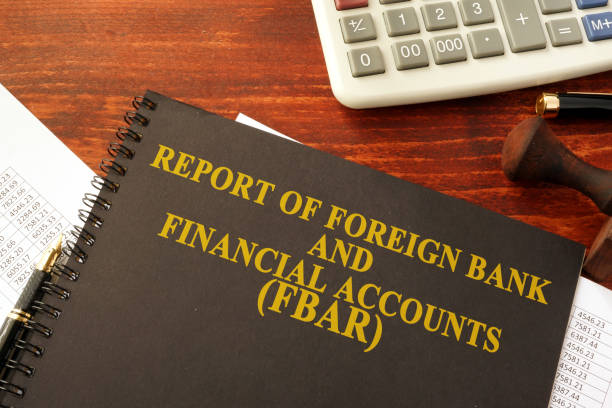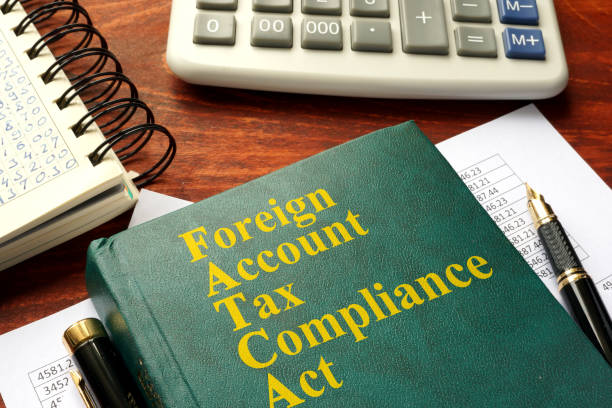Many people who have moved to the U.S. from a foreign country have banking and financial accounts, and other financial assets outside the United States.
Those who meet certain criteria when it comes time to file a tax return in the U.S. are obligated to report bank and financial accounts and other financial assets outside the United States in accordance with the requirements of the Report of Foreign Bank Financial Accounts (FBAR) and Foreign Account Tax Compliance Act (FATCA).
Taxes will not be incurred depending on the balance of assets reported in both reports, but failure to report them will result in serious penalties.
This time, I would like to introduce the outline of the FBAR and FATCA and the reporting obligations, respectively.
FBAR: Obligation to Report Overseas Banks and Financial Accounts
Overview

FBAR requires you to report bank and financial accounts literally outside the United States through a form called FinCen Form 114 (formerly Form TD F 90-22.1).
The main purpose of FBAR is to prevent money laundering and to disclose financial accounts outside the United States to U.S. authorities.
FBAR’s filing due date overlaps with that for tax returns, but FBAR is not part of the tax return (Form 1040) filed with the International Revenue Service (IRS), but based on the Bank Secrecy Act, the Financial Crimes Environment Network (FinCEN), a division of the U.S. Treasury Department.
FinCen Form 114 will be submitted on April 15, and it can be extended until October 15 if necessary.
FinCen Form 114 requires electronic filing, but this electronic filing must use a different system than the IRS-controlled electronic filing for tax returns.
Who Must Report
Basically, all persons who meet the following two conditions are obliged to submit FinCEN Form 114.
- US Person (U.S. citizen, U.S. resident, U.S. entity)
- Total annual maximum balance of bank and financial accounts outside the U.S. exceeds $10,000
In addition, since FBAR is required to submit each account holder, even if the tax return is filed by married filing jointly status, each couple is obligated to submit the FBAR separately.
In addition, even if the account holder is a dependent such as a minor, as long as he/she is the legal owner of the account, the dependent individual must submit his/her own FinCEN Form 114.
U.S. Person (U.S. Citizen, U.S. Resident, U.S. Entity)
A U.S. resident is a green card holder and a U.S. tax resident who is under the substantial presence test, etc.
For more information on U.S. residents and the substantial presence test, see a separate article below:
Depending on the type of visa you have in the U.S., such as holders of F-1 or J-1 visas, submitting a Form 8843 will prevent you from being eligible for the substantial presence test.
Therefore, in the case of international students and trainees, they are not required to file FBAR.
If you are a U.S. nonresident who is treated as a U.S. resident based on the Internal Revenue Code 6013(g) or 6013(h) election, you are still treated as a U.S. nonresident under FBAR requirements, so there is no obligation to file FinCEN Form 114.
Reporting Threshold
If you are a U.S. person, you must file FinCen Form 114 if aggregate value of financial accounts held outside the United States exceeds $10,000 at any time during the calendar year.
For example, if you have an account of $7,000 at Bank A outside the United States and $6,000 at Bank B, your total assets will exceed $10,000, so you will need to disclose all of the accounts outside the United States.
If the unit currency of the account is not U.S. dollars, you will need to convert the balance, using the exchange rate dated December 31 of the applicable calendar year listed in Treasury’s Bureau of the Fisher Service.
Round up the rounding of U.S. dollars calculated using exchange rates.
If you are not the legal account holder of an account outside the United States, but you have signature authority for that account, you must disclose the account as a signatory.
For example, if, as the CFO of a company, you hold the right to sign a bank account in the name of the company, the CFO must disclose the bank account in the company name on the personal FBAR, along with the account in the personal name of the CFO.
As a result, the bank account will be disclosed on the FBAR submitted by both the CFO individual and the company, respectively, because the company is also obligated to disclose it as an account holder.
What to Report
Bank and financial accounts outside the U.S. reported by FBAR include:
- Bank accounts (including deposits and custodial accounts)
- Stocks and other securities held in financial accounts
- Accounts managed and provided by employers (including foreign defined benefit pensions, defined contribution pensions, internal deposits, retirement allowances, etc.)
- Life insurance or annuity contract with a cash-value
Penalty
If FinCEN Form 114 is not submitted properly, a penalty of up to $10,000 will be imposed.
In willful, a penalty of $100,000 or 50% of the account balances will be charged, whichever is greater.
In addition, criminal penalties may apply.
FATCA: Obligation to Report Overseas Financial Assets
Overview

FATCA requires you to report overseas financial assets outside the United States through a form called Form 8938.
FATCA’s main purpose is to strengthen the detection of tax evasion by concealing assets outside the United States and to disclose financial assets outside the United States to U.S. authorities.
Unlike FBAR, Form 8938 is part of a tax return and is filed with the IRS along with Form 1040.
Therefore, the filing date of Form 8938 is April 15 and can be extended until October 15 if necessary.
FBAR and Form 8938 are fairly similar, but they are submitted to different authorities, so one submission does not exempt the other.
Who Must Report
Basically, all persons who meet the following two conditions are required to submit Form 8938.
- Specified Person (U.S. citizen, U.S. resident, specific U.S. entity)
- The total annual balance of financial assets outside the U.S. exceeds a certain amount
If you are not obligated to file a tax return, you will not be required to submit Form 8938.
Specified Person (U.S. Citizen, U.S. Resident, Specific U.S. Entity)
The definition of a U.S. citizen and a U.S. resident is basically the same as the definition discussed in the FBAR section, but there are some things to be aware of.
Under the provisions of IRC 6013(g) and 6013(h), FBAR did not require a US nonresident who are treated as U.S. resident to file FinCEN Form 114, but for Form 8938, such U.S. residents are required to file Form 8938.
Reporting Threshold
If you are a specified person, you must file Form 8938 if the conditions shown in the table below meet.
| Single and Married Filing Separately | Married Filing Jointly | |
| Living in the U.S. | Total value of assets was more than $50,000 on the last day of the tax year, or more than $75,000 at any time during the year | Total value of assets was more than $100,000 on the last day of the tax year, or more than $150,000 at any time during the year |
| Living outside the U.S. | Total value of assets was more than $200,000 on the last day of the tax year, or more than $300,000 at any time during the year | Total value of assets was more than $400,000 on the last day of the tax year, or more than $600,000 at any time during the year |
Same as FBAR, if the unit currency of the account is not U.S. dollars, you need to convert the currency, using the exchange rate on the last day of the applicable tax year (usually December 31) as described in Treasury’s Bureau of the Fisher Service.
Round up the rounding of U.S. dollars calculated using exchange rates.
In addition, unlike FBAR, the signatory is not obligated to disclose the account with the right to sign under Form 8938.
What to Report
Financial assets outside the United States reported in Form 8938 include:
- Bank accounts (including deposits and custodial accounts)
- Stocks and other securities held in financial accounts
- Accounts managed and provided by employers (including foreign defined benefit pensions, defined contribution pensions, internal deposits, retirement allowances, etc.)
- Life insurance or annuity contract with a cash-value
- Financial assets not held in financial account (such as stock certificates you have)
Like FBAR, land, foreign currencies, precious metals, art, etc. are not subject to reporting, but the scope of reporting is wider than FBAR.
Penalty
If Form 8938 is not filed properly, a penalty of up to $10,000 will be imposed, and if you fail to disclose within 30 days of receiving a notice from the IRS, you will be fined $10,000 every 30 days. In the worst case, fines of up to $60,000, plus criminal penalties, can be imposed.
In addition, if income from undisclosed assets is not accounted for, you may have to pay a penalty equal to 40% of that underpayment.
If you underpay your tax due to fraud, you must pay a penalty of 75% of the underpayment due to fraud.




コメント